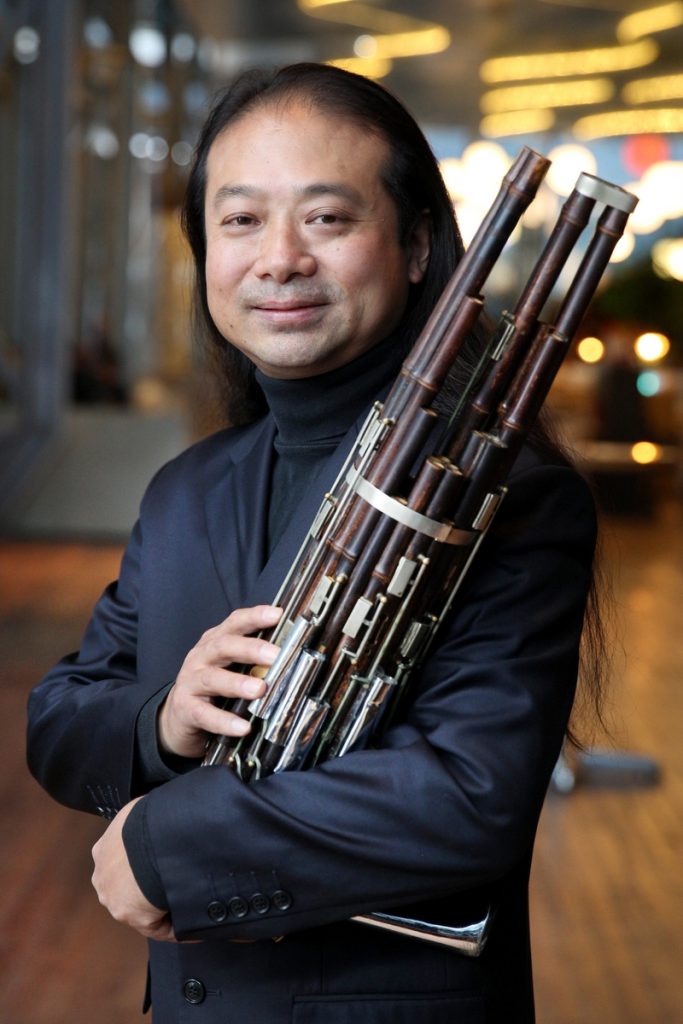by Jarrett Hoffman

“It told a famous Chinese story about someone who cannot really play this instrument,” he said during a recent interview on Zoom. “There is a queen who wants to have 300 sheng players perform together. So sheng players are requested, and one volunteer decides to make a fake sheng and just gesture with his body, as if he’s playing,” Wu Wei said, swaying back and forth on camera to demonstrate.
Rest assured, when a man carrying a sheng enters the stage of Gartner Auditorium at the Cleveland Museum of Art on Friday, March 11 at 7:30 pm, he will be someone who knows a thing or two about how to play it.
An internationally-renowned sheng virtuoso who teaches at the Shanghai Conservatory, Wu Wei is also considered the instrument’s leading avant-garde figure, having dedicated a significant portion of his career to expanding its repertoire through arranging, commissioning, and composing.
So it’s no wonder that his performance at CMA will traverse not only traditional music from early in the history of this 3,500-year-old instrument, but also Baroque and contemporary classical music. The program includes works by J.S. Bach, Antonio Vivaldi, Unsuk Chin, Huang Ruo, Chong Kee Yong, Mao Yuan, Fang Man, Nie Er, and Wu Wei himself, who will be joined at times by members of The Cleveland Orchestra. Tickets are available here.
Wu Wei is excited to be back in Cleveland after an absence of several years, and this time with a solo program. He had planned to return in 2020, but his concert at the Museum was canceled due to the pandemic — as was an entire U.S. tour.
He will begin his program in the 7th century with Banchikicho no Choshi, representing the genre of gagaku, a style of ancient Japanese court music. But as he pointed out, the genre was introduced to Japan from China, and its origins can be traced back much earlier. “Sometimes I ask myself — after thousands of years, how has it not disappeared?” he said, laughing.
Japanese delegations came to China in the year 589 to learn about the culture, including the court music. “As a musician, I wanted to follow that route,” Wu Wei said. “That’s why I came to Japan to study gagaku in 2009. I think it’s a very important part of our past, and it’s important for me to share.”
That path continued on to Germany after the German Academic Exchange Service and the Friedrich Naumann Foundation awarded him a scholarship to study at the Hanns Eisler School of Music Berlin, the city where he still lives. Armed with a modified, chromatic sheng developed by one of his professors back at the Shanghai Conservatory, Wu Wei set out to create a larger and more varied repertoire for the instrument.
“That’s one reason why I came to the West,” he said. “I wanted to develop the repertoire from different directions — jazz, Baroque, and later also contemporary.”
Speaking of contemporary, Wu Wei noted that the ancient music of gagaku, with its unique harmonic system, can in fact sound very modern to listeners both Western and Eastern. “For me it’s timeless,” he said. “Sometimes I feel it’s not about expressing my own private emotions as a human — I think this kind of music is for the sky, for nature.”
He sees a connection there with Bach. “His music is also in this dimension,” Wu Wei said, gesturing up and down. “It’s about leaving behind the human ego to open up much more space, communicating with our universe. That’s a big reason why I chose both gagaku and Bach for my program.”
When Wu Wei began his musical studies at age five, it was actually on a string instrument: the erhu. “And that year I was already onstage,” he said. “I ended up winning a prize in a competition in my province, and my professor asked me, are you interested in learning sheng?”
The character from the comic film popped into his head — an image that he noted is not a positive one for the instrument. “But I thought to myself, I like music, so why not?” Perhaps it didn’t hurt that the sheng is associated with the phoenix, a creature that carries a strong sense of symbolism. “It brings you light, luck — everything good.”
Playing the sheng was a big change. Wu Wei said that the instrument’s transparent tone lends itself to something more elegant and abstract than the expression of personal emotion, not unlike gagaku music itself. “It keeps some distance, and creates this flowing stream of sound that just makes magic.”
Published on ClevelandClassical.com March 4, 2022.
Click here for a printable copy of this article




